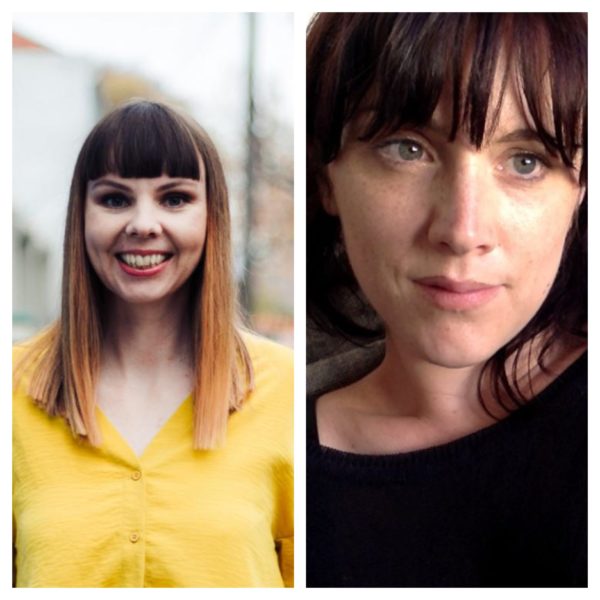
FWA: Tell us a little about why you are focussed on the Young Adult novel? Is there a particular aspect of YA fiction that draws you in or is it a whole range of factors?
SP: As both a reader and a writer I’m drawn to strong pacing, distinctive voice, themes of identity, and things of that nature. And I feel guaranteed to find all those elements in YA. There’s also something deeply joyful about writing for young people.
BK: I like writing that pushes the boundaries, and YA fiction, in the way it straddles genre and content, is perfectly positioned to do just that. I’m also a softie for a hopeful ending – particularly after the last couple of years, a little bit of hope is a big thing!
FWA: It is said that a lot of YA readers are adults – so can you talk a little about who reads YA fiction?
SP: It’s difficult to tell because you might look at who is reviewing books, for example, as a sign of who is reading them but then you’re only analysing a certain percentage of the market and, I would argue, a certain type of reader. The same goes for looking at who buys YA books. I do know that when I visit schools I often see YA books in the hands of teens, being read and enjoyed. As a writer my sole focus is on my primary audience: teens. Any other reader is a bonus but I’m not writing with them in mind.
BK: It’s funny, because my work brings me into contact with a lot of readers of YA, and I’d have to say that we’re a diverse group! At the bookshop, a lot of parents and grandparents are buying YA, although there’s a regular contingent of teen readers who come in and know exactly what they want. Then there’s the book clubs and book lovers, which are the readers I see myself in (I’m a big book nerd from way back). There’s the reluctant readers, who are perhaps the most satisfying to come across if you can get them hooked on the right book (and I don’t buy the argument that boys = reluctant) and of course the community of YA writers and bloggers and teachers, who are so fundamental in making the Australian YA scene in particular, what it is.
FWA: There are many worthy YA novels that win awards and some become part of the school curriculum. And, there are the books that YA readers love to read. Are these the same books? Why or why not.
SP: I think there’s often overlap, especially with those that win awards and those that become a part of the school curriculum. I think because the market is so small here, for a book to do well it needs the push offered by an award listing or by becoming a class text and that’s why we tend to publish YA books with high levels of literary merit and themes that suit academic analysis.
BK: I do think there’s some truth to the saying that there’s no greater way to kill a book than to study it. I’ve seen books that have been bestsellers in the bookshop beloved by readers who come to it on their own terms, get an enormous thumbs down by readers who have studied it. I mean, I get it, I don’t like being told what to read either. I think what young people are reading is constantly evolving, and while I celebrate the role of awards and the curriculum in bringing books to readers, and elevating their significance, I don’t think they’re the only marker of how good a book is. What we’re looking for in a book when we’re adolescents is different for everyone, and I think we need to allow space for that intimacy with reading as well.
FWA: Over the years you have both been publishing how have YA novels changed?
SP: One thing I’ve noticed is that books seem to be getting longer—I’d love to see shorter books getting a look in, as well as novellas. I also feel like I see fewer books pitched to a younger teen audience, which again is something I’d love to see more of. On a more positive note, I see a lot more diverse storytelling these days and I hope to see a lot more in the future too.
BK: I agree! We’ve had a lot of anthologies of late, and these have been a great way to introduce diverse and emerging writers. But like Shivaun, I’d love to see novellas – like Marlee Jane Ward’s ‘Welcome to Orphancorp’, which was so brilliant – and more short stories getting published. I’d also really like to see more horror! There’s been a rise in the YA crime/thriller genre in the last five or so years, but I’m definitely here for a revival of the old camp horror from the late 80s, early 90s.
FWA: What is the main thing you hope participants in the course will have achieved at the end of the program?
SP: I hope participants finish a rough first draft of their YA novel and that they walk away with the tools and the confidence to see their project through all the way to the end.
BK: I’d love participants to come out of this with a network of peers that can support them in the second draft and on the road to publication, and also a confidence in the genre that allows them to play with the form, and really find their own unique voice.
Writing the YA Novel
with Shivaun Plozza and Bec Kavanagh
ONLINE
8 May – 2 October 2024
SCHOLARSHIP AVAILABLE